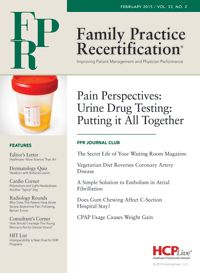Publication
Article
Family Practice Recertification
Benzodiazepine Use and Risk of Alzheimer's Disease
Author(s):
A study looking at the link between benzodiazepine exposure and risk of Alzheimer's Disease.

Frank J. Domino, MD
Review
Billioti de Gage S, et al. Benzodiazepine use and risk of Alzheimer's disease: case-control study. BMJ. 2014 Sep 9;349:g5205. http://www.bmj.com/content/349/bmj.g5205.
Study Methods:
This case-control study reviewed dispensation claims from the Quebec health insurance program database (RAMQ) to examine the relationship between patient exposure to benzodiazepines and the risk of Alzheimer’s disease in older adults.
Participants included older adults (age >66) living in the community in Quebec and were members of the public drug plan from January 2000 to December 2009. Cases were random samples of people with a first diagnosis of Alzheimer’s disease who had records in the RAMQ for at least 6 years prior to the diagnosis. They were matched with controls on sex, age group, and duration of follow-up in a 4:1 ratio.
Benzodiazepine use was ascertained from the RAMQ database. With the goal of reducing reverse causality bias (a phenomenon where benzodiazepines are prescribed to treat the prodrome of dementia), patients whose treatments were initiated less than 5 years before the index date (date of diagnosis of Alzheimer’s) were not included in the analysis.
Results were adjusted for several potential confounders including hypertension, myocardial infarction, stroke, hyperlipidemia, diabetes mellitus, anxiety, depression, and insomnia.
Results & Outcomes:
The adjusted odds ratio for risk of Alzheimer’s disease for people who had at least one claim for a benzodiazepine during the study period was 1.51 (95% CI: 1.36-1.69). This meant that the risk of Alzheimer’s disease was increased by 51% among those who had used benzodiazepines in the past compared to those who did not. The results were not markedly different when adjusted for depression, anxiety, and insomnia (OR 1.43; CI: 1.28-1.60).
When cumulative exposure to benzodiazepines was analyzed, no increased risk of Alzheimer’s disease was found for exposure of up to 3 months of benzodiazepine use, but after 3 months, the risk increased with cumulative exposure (OR 1.32 (CI: 1.01-1.74) for 3 to 6 months and OR 1.84 CI: 1.62-1.08) for more than 6 months).
The association with Alzheimer’s disease was also stronger for long acting benzodiazepines (OR 1.70; CI: 1.27-1.61) than for short acting ones (1.43; CI: 1.46-1.98).
Conclusion:
The risk of Alzheimer’s disease in older adults was significantly associated with prior benzodiazepine use with a 43-51% increased risk. Patient risk further increased with cumulative exposure and a longer half-life of medication. Results did not significantly differ when adjusted for confounding conditions that are thought to be potential prodromes to dementia.
Commentary:
Dementia affects about 36 million people worldwide1 and there are currently no effective treatments for this life-altering disease. Benzodiazepines are prescribed chronically in older adults (typically for insomnia) despite conferring a significantly higher risk of all-cause mortality2, falls and withdrawal symptoms upon discontinuation. Several studies document the acute deleterious effects of benzodiazepines on memory and cognition3-6 and there are other studies which document their long-term effects that are consistent with the present study.7-11
The strengths of this study include its design and sensitivity analysis to reduce the likelihood of reverse causality bias. By only looking at benzodiazepines that were prescribed at least 5-6 years before the diagnosis of Alzheimer’s the authors attempted to eliminate benzodiazepine prescriptions that were written to treat symptoms that were prodromal to Alzheimer’s. The additional analysis of the relationship between cumulative benzodiazepine dose and Alzheimer’s disease adds credence to a possible pharmacologic cause-effect theory of benzodiazepine use and Alzheimer’s.
Possible limitations of this study include the inherent potential for bias in using claims databases for example, misclassification, misdiagnosis, and a delay between the actual date of onset of Alzheimer’s disease and the date of its documentation. Additionally, we do not know the actual reason why benzodiazepines were prescribed in these patients.
Perhaps some received benzodiazepines for the very early (beyond 5 years) symptoms of dementia and the diagnosis was delayed by confounding factors. Or maybe some co-morbidity that was treatable with benzodiazepines is also related to dementia.
The use of benzodiazepines has many other hazards in this population, including increased risk of falls, and possible increases in risk for all-cause mortality. Use of non-benzodiazepine hypnotics (“Z” drugs) are also associated with an increased risk of falls, and may have similar other adverse effects. A reasonable next study would be to compare the risk of the non-benzodiazepine sedative/hypnotic drugs for dementia risk.
Limit use of these classes of drug in senior citizens, and limit use in all adults to less than 6 months unless absolutely necessary. Remember the first and most important step in the treatment of insomnia in a geriatric population is to use non-pharmacologic methods (exercise, light therapy, etc.), resorting to medications only if absolutely necessary.
References:
1. World Alzheimer Report 2009. Alzheimer Disease International, 2009.
2. Weich S, et al. Effect of anxiolytic and hypnotic drug prescriptions on mortality hazards: retrospective cohort study. BMJ. 2014;348:g1996.
3. Lister RG. The amnesic action of benzodiazepines in man. Neurosci Biobehav Rev
1985;9:87-94.
4. Ghoneim MM, Mewaldt SP. Benzodiazepines and human memory: a review.
Anesthesiology 1990;72:926-38.
5. Curran HV. Tranquillising memories: a review of the effects of benzodiazepines on human
memory. Biol Psychol 1986;23:179-213.
6. Buffett-Jerrott SE, Stewart SH. Cognitive and sedative effects of benzodiazepine use.
Curr Pharm Des 2002;8:45-58.
7. Wu CS, Wang SC, Chang IS, Lin KM. The association between dementia and long-term
use of benzodiazepine in the elderly: nested case-control study using claims data. Am J
Geriatr Psychiatry 2009;17:614-20.
8. Wu CS, Ting TT, Wang SC, Chang IS, Lin KM. Effect of benzodiazepine discontinuation
on dementia risk. Am J Geriatr Psychiatry 2011;19:151-9.
9. Lagnaoui R, Begaud B, Moore N, Chaslerie A, Fourrier A, Letenneur L, et al.
Benzodiazepine use and risk of dementia: a nested case-control study. J Clin Epidemiol
2002;55:314-8.
10. Gallacher J, Elwood P, Pickering J, Bayer A, Fish M, Ben-Shlomo Y. Benzodiazepine use
and risk of dementia: evidence from the Caerphilly Prospective Study (CaPS). J Epidemiol
Community Health 2012;66:869-73.
11. Billioti de Gage S, Begaud B, Bazin F, Verdoux H, Dartigues JF, Peres K, et al.
Benzodiazepine use and risk of dementia: prospective population based study. BMJ
2012;345:e6231.






